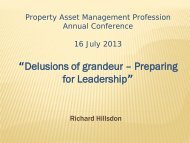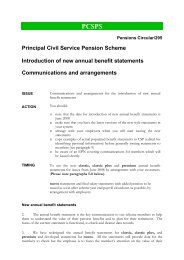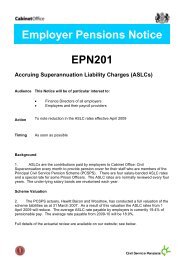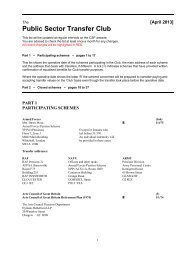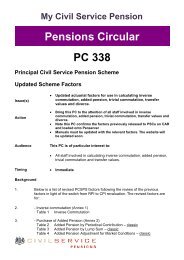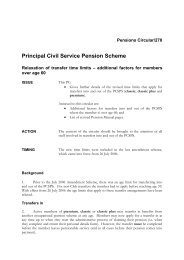Capability Reviews: Progress and Next Steps - The Civil Service
Capability Reviews: Progress and Next Steps - The Civil Service
Capability Reviews: Progress and Next Steps - The Civil Service
- No tags were found...
You also want an ePaper? Increase the reach of your titles
YUMPU automatically turns print PDFs into web optimized ePapers that Google loves.
Amongst the actions that we prioritised were: reshaping HR to deliver the strategy,whilst preparing for shared services, revamping the induction process, launching anew brokerage service <strong>and</strong> introducing a new learning <strong>and</strong> development offer. <strong>The</strong>progress we have made was highlighted recently by ‘People Week’, a new venturededicated to explaining how HR works, offering taster training sessions, HRsurgeries <strong>and</strong> seminars on the department’s new values. With over 80 events,proactive board endorsement <strong>and</strong> a range of different communication channels,People Week was a great success <strong>and</strong> an important demonstration to staff of howHR has become a proactive, customer-focused driving force for the department.<strong>The</strong> progress we have made has been acknowledged by the review team (“Werecognise the progress you have made through … improvements in Cabinet Officesystems, including tangible action in HR”), by a board member (“HR are definitelyon an upward trend”) <strong>and</strong> most importantly by staff (“It’s a very welcomedevelopment by the Cabinet Office for its staff”).’Case study: Performance management in the Department for Business,Enterprise <strong>and</strong> Regulatory Reform (BERR)‘Every department has a challenge in building a high-performance culture at alllevels. In BERR we have made it very clear to everyone that objective setting <strong>and</strong>mid- <strong>and</strong> end-year reviews are a key part of their role as a member of thedepartment, <strong>and</strong> that a manager’s own performance will partly be judged by theirability to performance manage their staff.But compliance with the process is not enough: we see the key to a performanceculture being in the ability to give <strong>and</strong> receive honest feedback. To that end,members of the management board set time aside to give each other feedback <strong>and</strong>to work on feedback with their own staff. Cross-departmental training programmeshave also been established, which aim to address the issue from another angle. Forexample, there has been a very positive response to a diversity training programmefor senior managers, which included role-playing giving feedback to staff with verydifferent backgrounds from the manager.’At a year after the review:• Staff have responded to changes in performance management. Clear messageshave been communicated <strong>and</strong> the basics set up, with appraisals completed <strong>and</strong>pay awards paid on schedule. Some tougher conversations are being had on poorperformance <strong>and</strong> ‘priority movers’ (surplus staff) are being dealt with moreproactively (DCSF).38 COMMON CAPABILITY GAPS: PROGRESS AND NEXT STEPS



